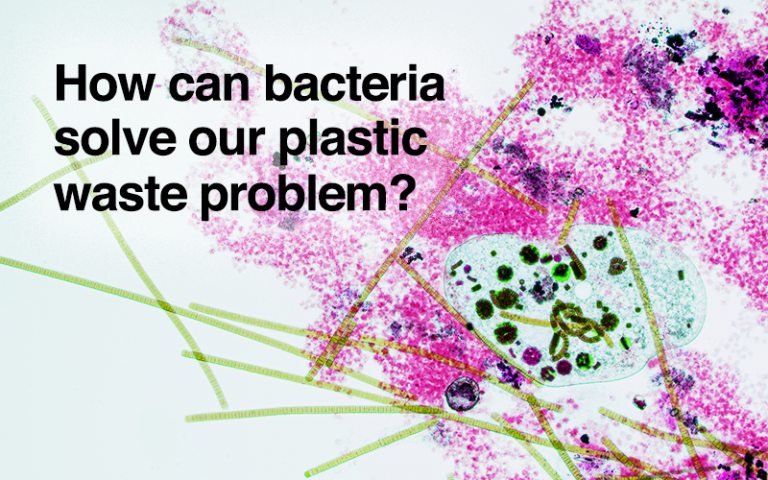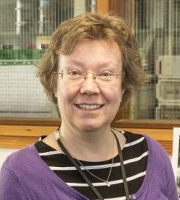How can bacteria solve our plastic waste problem?
Scientists from different disciplines at UCL have combined forces to address the problem of plastic waste with help from behavioural science, chemistry, and hundreds of compost heaps.

- What action can I take?
Take part in UCL's big compost experiment.
Pledge to take this action via the 'thumb up' icon - in the 'Pledge your action' box to the right (desktop) or below (mobile).
Inspire others by sharing this page and/or your pledge on social media. Use #UCLGenerationOne #COP26 #ClimateUCL @UCL @SustainableUCL.
Unfortunately, the answer right now to how bacteria can help address plastic pollution is “slowly”. Most plastics are designed to be durable, which means they are hard to break down or convert into smaller and different pieces. That’s good news while the plastics are being used, typically to protect and package food, drinks, and other goods. But it becomes a real problem the moment those plastics reach the end of their useful life. Which for some single-use plastics can be very quickly indeed.

Ayşe Allison, who is studying for a PhD in behavioural science at UCL, is working to find out. As part of a project run through the UCL Plastic Waste Innovation Hub and UCL Centre for Behaviour Change, Allison is asking people what affects their decisions to buy or avoid biodegradable and compostable plastic packaging. She says:
“Our work is helping us understand citizen behaviours that contribute to plastic and food waste.”
Her research showed that four out of five people said they would buy products with packaging marked ‘compostable’ or ‘biodegradable’. But it also revealed how some were put off by confusing terminology and lack of detail on how to dispose of packaging. The study also showed many people did not know how to dispose of the compostable plastics properly. One respondent said: “It needs to be made clearer if hot composting [a technique that uses higher temperatures to speed up microbial activity] is required.”
Plastic persuasion
“One implication of the findings is that knowledge on its own is not effective. So, just giving people information, raising awareness, educational campaigns, and social marketing isn't going to be enough.”
What would work better? “You could use much more persuasive techniques,” she says. One example could be to make people associate the proper disposal of packaging with positive feelings, perhaps by making clear that other people are doing the same. In other words, those people who do the right thing could help by simply talking to their friends about it. But that won’t be enough either, she says, unless people are offered reliable and accessible waste collection services.
How much will the right behaviour help? Getting the compostable plastic to a compost heap is a good start, but unfortunately, it’s rarely the end of the story. Other research in the UCL Plastic Waste Innovation Hub shows that some so-called ‘green plastics’ are much less compostable than others.
Taking a citizen-science approach, the hub has signed some 10,000 people to the Big Compost Experiment, to see how long packaging labelled as “biodegradable” and “compostable” take to degrade in a household composter. Initial analysis shows that after eighteen months, biodegradable packaging was still visible in two out of three compost bins.
Wicked problem
While compostable materials could help, the problem of plastic waste must be addressed in various ways, says Professor Mark Miodownik, a UCL materials scientist who helped to set up the hub. “Plastic waste is not something that will be solved by any one discipline or by any one solution. It’s a so-called wicked problem that affects so many different systems and people and the way they behave.
“So, we realized that we at UCL should get together and start a hub where different disciplines can work together to solve it, or at least contribute to the solutions.”

One answer to that is not to make them green, or brown, or indeed any colour. “The ideal is to have them all transparent, because then bottles from different companies and products can all be collected and recycled together to make new bottles,” he adds. Another is to introduce deposit schemes to encourage people to return plastic bottles. The Scottish government plans to introduce such a system next year.
Institutions and organisations can do their bit as well, he points out. UCL, for example, has pledged to phase out single-use plastics by 2024. To that end, the university has introduced a reusable and returnable coffee cup scheme on campus, while scientists have redesigned how they manage their laboratories to consume fewer plastic gloves, pipette tips, and other consumables used in experiments.
Bugs and bins

How? She is looking at enzymes called PETases, which can break down standard PET plastic bottles. “We’re seeing if we can make them work better, because the levels of degradation with these PETases are still fairly slow, although there are promising developments” she says.
Hailes has been taking her work home – baiting her own domestic compost heap with biodegradable tea bags and then testing it for bugs to break down compostable plastics or PET plastics that might do a better job. She says:
“What we’re looking for is microbial consortia that might be able to break down compostable plastics in the home, or which could be used as a top-up to try and break down compostable plastics in food waste.”
It’s part of a global effort, she says. Because speeding-up how Nature deals with plastics is one promising way to address what is very much a growing problem.
 Close
Close

